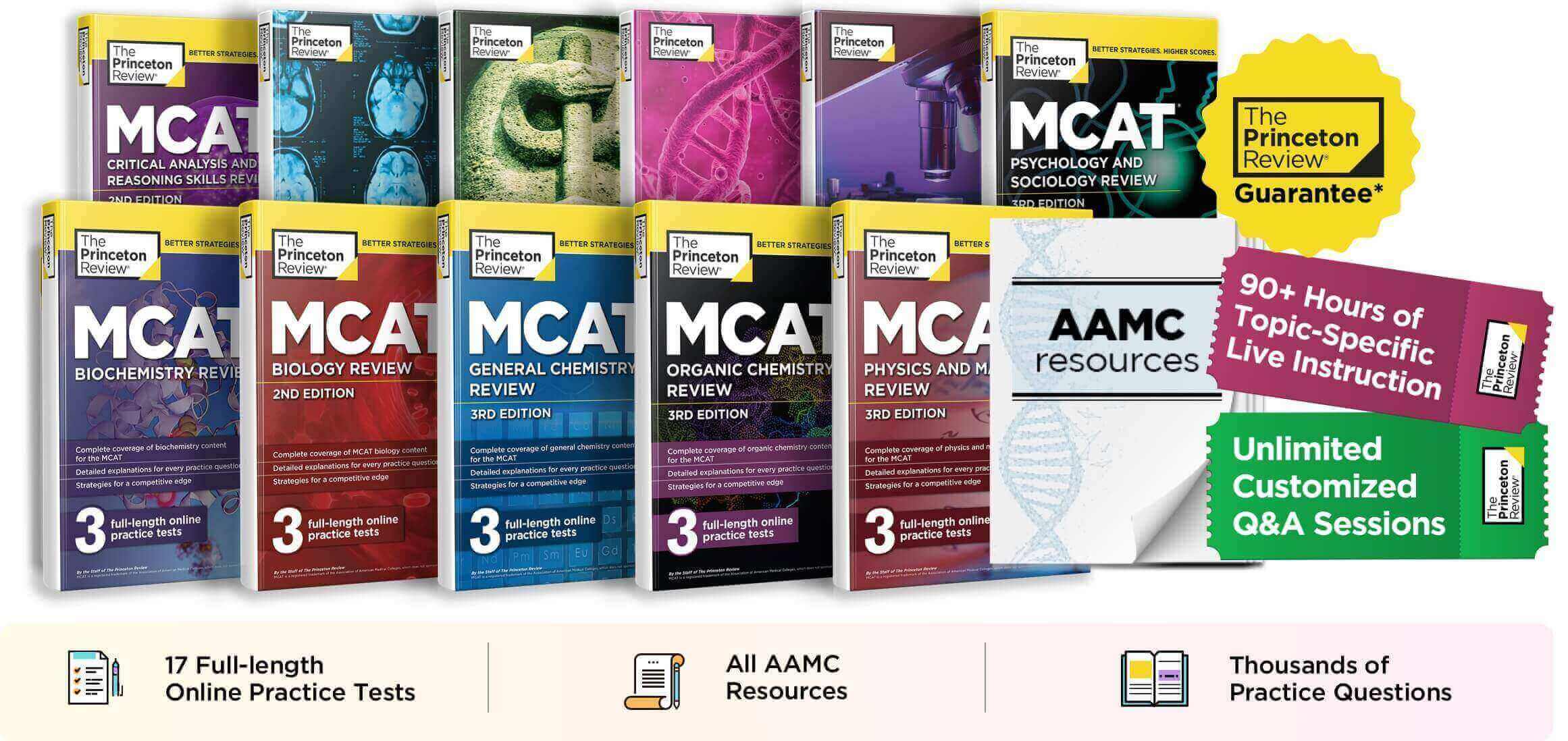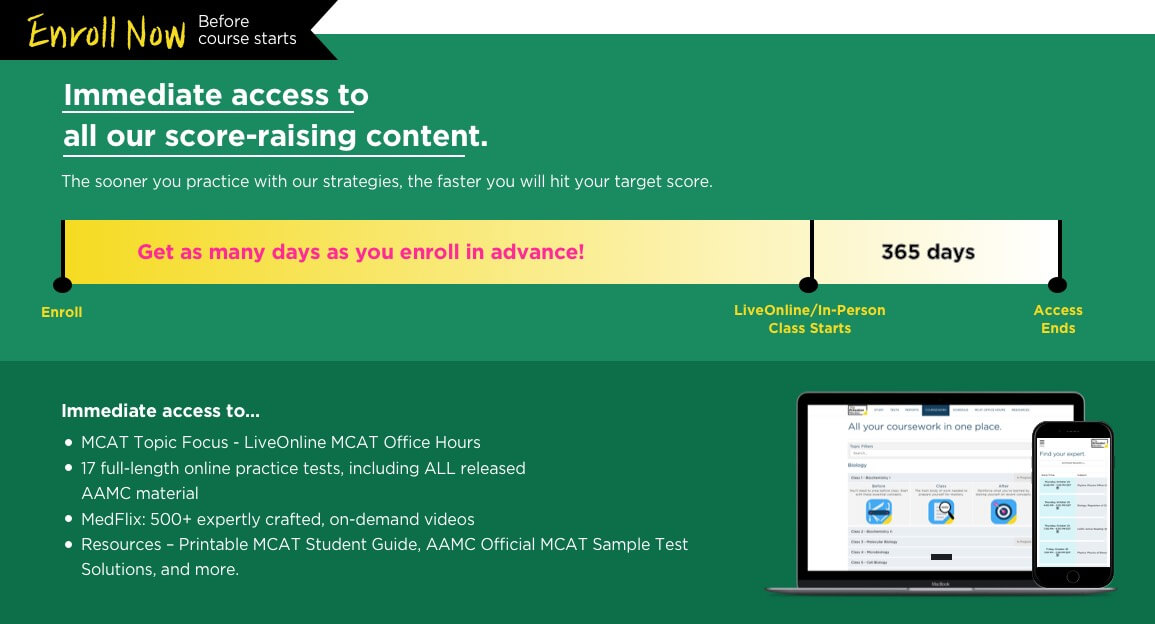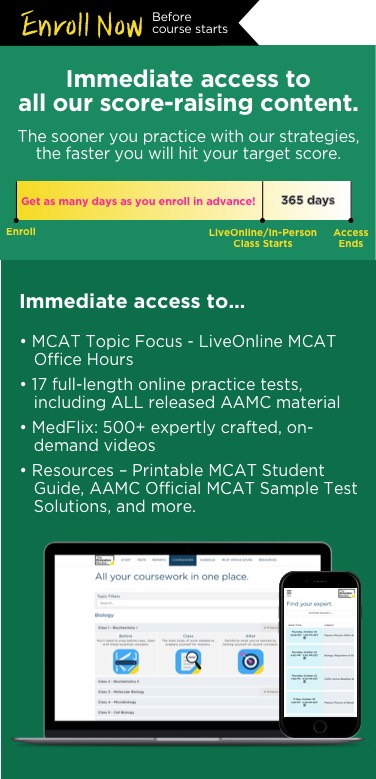MCAT® LiveOnline
Tailored to Fit Your Demanding Schedule
40 hours of instruction + full online resources
Pay $499 today!
Or pay in full

Achieve MCAT Success on Your Schedule
- 40 hours of live instruction
- 365 days access to all resources
- Unlimited access to MCAT Topic Focus (valued at $1399)
- 4 to 6 subject-matter experts
- 500+ MedFlix videos
- 17 full-length practice tests
- All official AAMC practice materials
- 35 diagnostic exams
- 12 single-subject practice tests
- Study Smart Planner
- Interactive score reports
- Thousands of practice questions
- 8 MCAT books, including 1 exclusive title
- Medical School Admissions Advantage Sessions
- The Princeton Review Guarantee - If you don’t score higher on your exam, we’ll refund your tuition.*
What We'll Cover in 40 Hours of Scheduled Classes
Maximize your score in every section by mastering strategies.
Class 1: Best Process of Elimination Practices for Organic Chemistry
Class 2: Learning & Understanding Organic Reactions
Class 1: Learn about passage and question types, highlighting and mapping, figures/experiments, special question types/techniques, sample passage
Class 2: Genetics Questions, Pedigrees
Class 3: Question Review Worksheet, Passage and Question Grids
Class 4: Analyzing Biology/Biochemistry Figures and Experiments
Class 1: Periodic Table and MCAT Math
Class 2: General Chemistry Experiments and More MCAT Math
Class 1: Technical emphasis passages and questions
Class 2: Conceptual emphasis passages and questions
Class 1: Research Design Questions
Class 2: Charts and graphs, experiment analysis
Class 1: Introduction to CARS Skills and Strategies
Class 2: Five Steps to Attacking Questions, Question Types Part I
Class 3: Question Types Part II, Stress Management
Class 4: Section-Wide Strategy
Introducing our Smart Study Planner New
We've put in the work to make your journey smoother and more efficient, so you don't have to!
Auto-generated Study Plan
Instant customized plan based on your
start and test date, plus daily study hours.
User-Friendly Interface
Drag and drop to tailor. Color-coded
blocks for easy distinction.
Complete To-Do List View
Efficiently track progress with a detailed list
view and automatic completion sync.



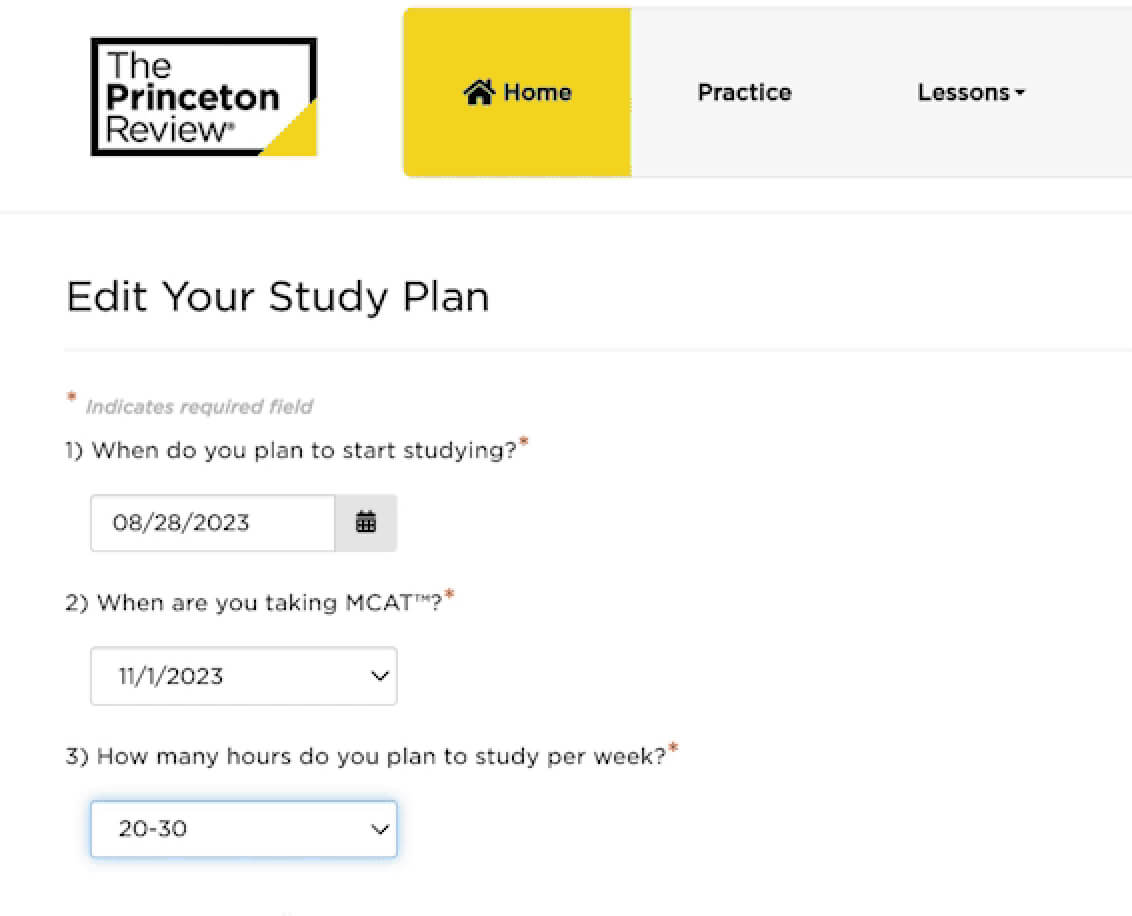
Auto-generated Study Plan
Instant customized plan based on your
start and test date, plus daily study hours.
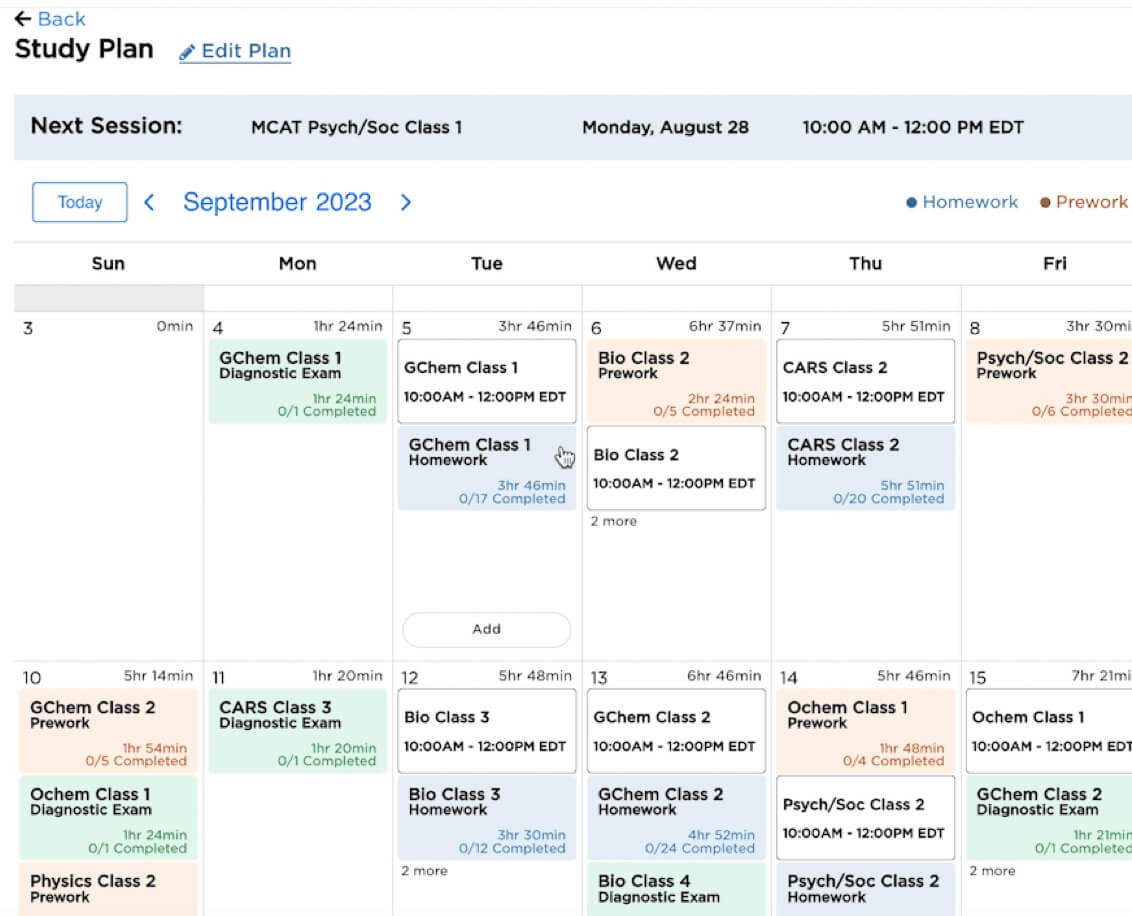
User-Friendly Interface
Drag and drop to tailor. Color-coded
blocks for easy distinction.
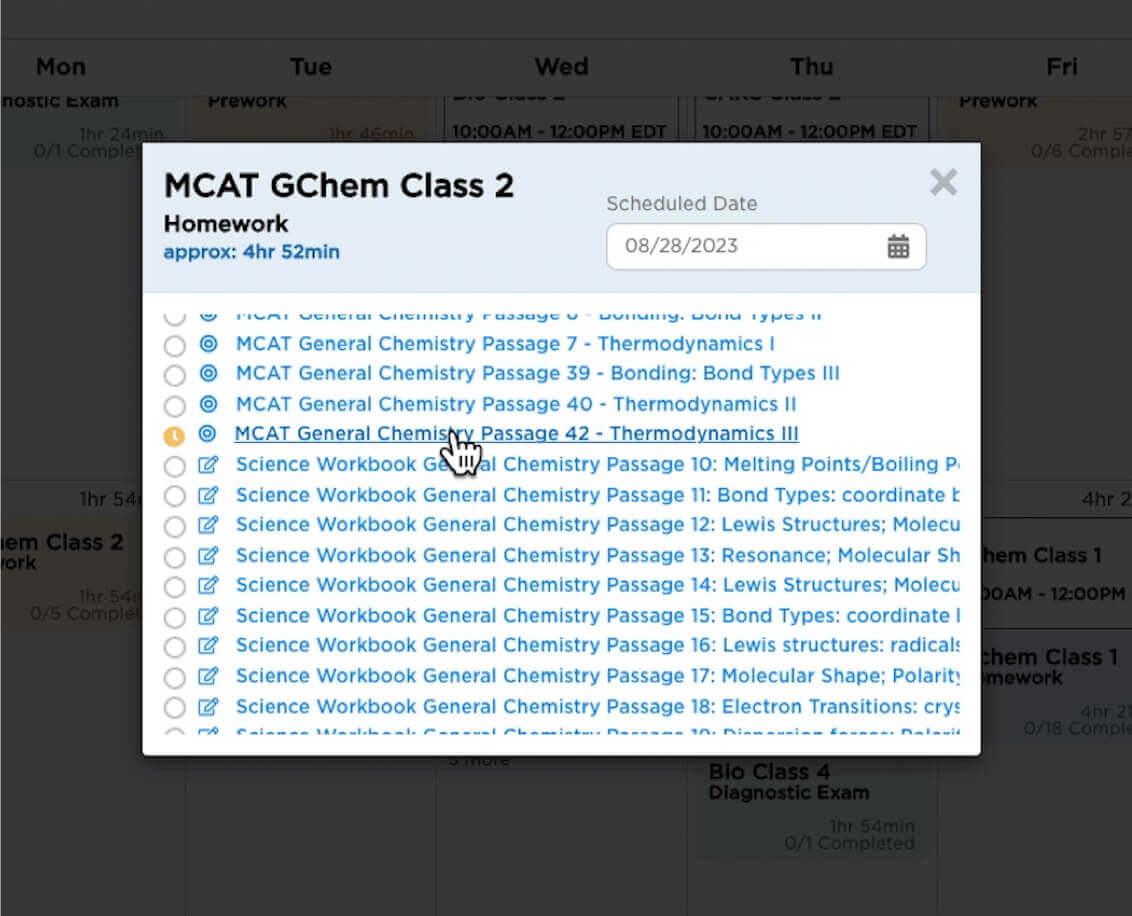
Complete To-Do List View
Efficiently track progress with a detailed list
view and automatic completion sync.
Score-Raising Online Resources
Join live sessions, engage in Q&A, attend Office Hours and more.

Topic-Specific Sessions
Each session targets a key
area where students struggle.
- 90 total hours of unique sessions
- Unlimited retakes, totaling 1,100+ hours
Unlimited Live Q&A Sessions
Get answer to your questions
from our subject-matter instructors.
- Unlimited 1-hour office hours
- 6 subjects covered every week
Sample Drop-In Schedule
Organic Chemistry: Carbohydrate Structure and Reactivity (Basic)
Physics: Predicting MCAT Physics Passage Questions (Advanced)
Biology: Mitosis/Meiosis (Basic)
Psychology/Sociology: Research Methods (Basic)
Biology: Biology Office Hours
CARS: Active Reading: Reading for Tone (Basic)
General Chemistry: Le Châtelier's Principle and Thermodynamics (Advanced)
CARS: CARS Office Hours
Psychology/Sociology: Psych/Soc Office Hours
Biology: Autonomic Nervous System (Advanced)
Organic Chemistry: IUPAC nomenclature (Basic)
Physics: Process of Elimination with Conceptual Questions (Basic)
Organic Chemistry: The Organic Chemist's Toolbox (Basic)
Biology: Pedigree Analysis (Advanced)
General Chemistry: Acid/Base Fundamentals (Basic)
Biology: Krebs Cycle Details (Advanced)
Physics: MCAT Math Review (Basic)
General Chemistry: Le Châtelier's Principle and Thermodynamics (Advanced)
Organic Chemistry: Ochem Office Hours
Biology: Introduction to Science Passages (Basic)
Psychology/Sociology: Psychological Disorders (Basic)
CARS: POE - Identifying and Eliminating Attractors (Basic)
Biology: Blood Pressure Regulation (Advanced)
Biology: Genetics Probability Basics (Basic)
CARS: Reading Efficiently: Claims and Evidence (Advanced)
Psychology/Sociology: Therapeutic Approaches (Basic)
General Chemistry: From Lewis Structures to Intermolecular Forces (Basic)
Biology: Action Potentials (Advanced)
Biology: Electrophoresis and Blotting (Basic)
Biology: Molecular Biology Techniques: Analyzing Gene Expression (Advanced)
Physics: Sound, Light, and Medical Imaging (Advanced)
CARS: Refining Your Strategy: Attacking Analogy and New Information Questions (Advanced)
Biology: Introduction to Science Passages (Basic)
CARS: Refining Your Strategy: Attacking Weaken and Strengthen Questions (Advanced)
Psychology/Sociology: Therapeutic Approaches (Basic)
CARS: CARS Active Reading (Basic)
Organic Chemistry: Tautomerism and Acidity (Advanced)
Biology: Biology Office Hours
Biology: Krebs Cycle Details (Advanced)
Physics: Physics Office Hours
Psychology/Sociology: Psych/Soc Office Hours
General Chemistry: ICEbox Problems (Advanced)
CARS: POE - Identifying and Eliminating Attractors (Basic)
Organic Chemistry: High-Yield Separation Techniques (Advanced)
Psychology/Sociology: Interpreting Charts and Graphs (Basic)
Biology: Regulation of Glycolysis/Gluconeogenesis (Basic)
Psychology/Sociology: Social Interaction and Culture (Basic)
General Chemistry: Acid/Base Fundamentals (Basic)
Physics: Dealing with Data in Physics Passages (Basic)
CARS: Down to Two Choices: What Do I Do (Basic)
Physics: Physics of Blood Flow (Advanced)
Biology: Molecular Biology Techniques: PCR Variations (Basic)
CARS: Refining Your Strategy: Attacking Reasoning Questions (Advanced)
Organic Chemistry: IUPAC nomenclature (Basic)
Biology: Electrophoresis and Blotting (Basic)
Physics: Energy Conservation and Systems (Advanced)
CARS: Reading Efficiently: Claims and Evidence (Advanced)
CARS: Refining Your Strategy: Attacking Inference Questions (Advanced)
Physics: MCAT Math Review (Basic)
CARS: CARS Office Hours
Organic Chemistry: Carbohydrate Structure and Reactivity (Basic)
General Chemistry: Gen Chem Office Hours
Biology: Krebs Cycle Details (Advanced)
Biology: Introduction to Science Passages (Basic)
Psychology/Sociology: Psych/Soc Office Hours
CARS: Maximizing Your CARS Score Through Self-Evaluation (Basic)
Physics: Physics Office Hours
Psychology/Sociology: Psych/Soc Office Hours
General Chemistry: Electrochemistry Tips and Tricks (Basic)
Psychology/Sociology: Social Interaction and Culture (Basic)
Biology: Mitosis/Meiosis (Basic)
Psychology/Sociology: Social Behavior (Basic)
Psychology/Sociology: Research Methods (Basic)
Biology: Regulation of Glycolysis/Gluconeogenesis (Basic)
General Chemistry: The Mole and MCAT Applications (Basic)
Physics: Physics Office Hours
General Chemistry: Le Châtelier's Principle and Thermodynamics (Advanced)
Biology: Biology Office Hours
Organic Chemistry: Tautomerism and Acidity (Advanced)
Organic Chemistry: Amino Acid Side Chains with Peptide Analysis (Advanced)
CARS: POE - Identifying and Eliminating Attractors (Basic)
Organic Chemistry: Ochem Office Hours
Organic Chemistry: Substitution Reactions (Basic)
Biology: Pedigree Analysis (Advanced)
Organic Chemistry: IUPAC nomenclature (Basic)
Biology: Electrophoresis and Blotting (Basic)
CARS: Attacking Difficult Passages (Advanced)
Psychology/Sociology: Memory (Advanced)
CARS: Reading Efficiently: Claims and Evidence (Advanced)
Psychology/Sociology: Therapeutic Approaches (Basic)
Organic Chemistry: High-Yield Separation Techniques (Advanced)
Organic Chemistry
General Chemistry
Psychology/Sociology
Biology
Physics
CARS
High Quality Resources
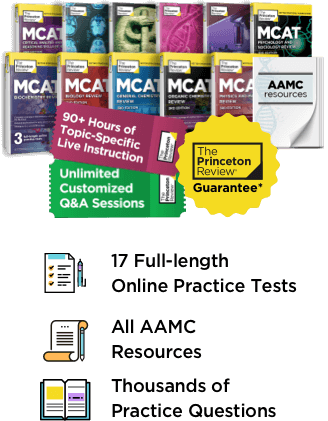
NEW! 12 MCAT Section
Specific Practice Tests
Efficiently improve your weaknesses by section.
All new, based on recent MCAT trends.









